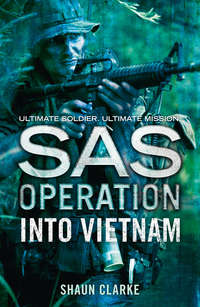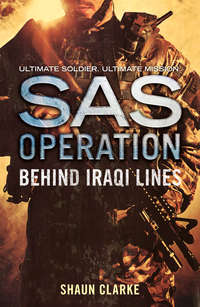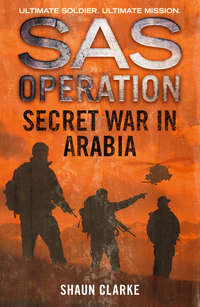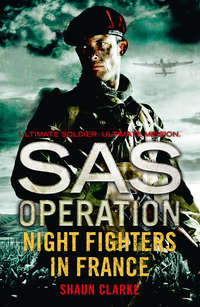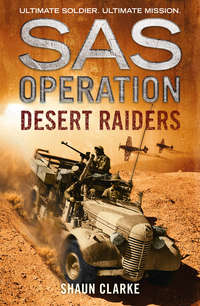
Полная версия
Guerrillas in the Jungle
When his recommendations had met with approval, Pryce-Jones, as the OC (officer commanding) of A Squadron in Minden Barracks, had sent Callaghan into the jungle to spend three months supervising the relocation of the kampongs and checking that the defence systems provided for them and the hearts-and-minds campaign were working out as planned.
Throughout that three months Callaghan had, like Pryce-Jones before him, travelled alone, from one kampong to the other, avoiding guerrilla patrols and mostly living off the jungle, covered in sweat, drenched by rain, often waist-deep in the swamps, drained of blood by leeches, bitten by every imaginable kind of insect, often going hungry for days, and rarely getting a decent night’s sleep.
In fact, it had been a nightmare, but since Pryce-Jones had done the same thing for twice that long, Callaghan wasn’t about to complain.
‘It wasn’t that difficult,’ he lied as the pretty WRAC corporal, Mary Henderson, brought in their cups of tea, passed them out and departed with an attractive swaying of her broad hips. ‘Although there are slightly over four hundred villages, most are little more than shanty towns, inhabited by Chinese squatters. Before we could move them, however, we had to build up a rapport with the aboriginals – in other words, to use your words, win their hearts and minds. This we did by seducing them with free food, medical treatment, and protection from the CT. Medical treatment consisted mainly of primitive clinics and dispensing penicillin to cure the aborigines of yaws, a skin disease. The kampongs and troops were resupplied by river patrols in inflatable craft supplied by US special forces, or by fixed-wing aircraft, though we hope to be using helicopters in the near future.’
‘Excellent. I believe you also made contact with the CT.’
‘More than once, yes.’
‘And survived.’
‘Obviously.’
Pryce-Jones grinned. ‘Men coming back from there brought us some strange stories.’
‘Oh?’
‘Yes. Your clandestine warfare methods raised more than a few eyebrows back here – not to mention in Britain.’
‘You mean the prostitutes?’
‘Exactly.’
‘The best is the enemy of the good. We did what we had to do, and we did our best.’
Pryce-Jones was referring to the fact that some of the kampong prostitutes had been asking their clients for payment in guns, grenades and bullets instead of cash, then passing them on to the guerrillas in the jungle. Learning of this, Callaghan had used some of his SF (Security Forces) troops, there to protect the kampongs, to pose as clients in order to ‘pay’ the prostitutes with self-destroying weapons, such as hand-grenades fitted with instantaneous fuses that would kill their users, and bullets that exploded in the faces of those trying to fire them.
‘What other dirty tricks did you get up to?’ Pryce-Jones asked.
‘Booby-trapped food stores.’
‘Naturally – but what about the mail? I received some garbled story about that.’
Now it was Callaghan’s turn to grin. ‘I got the idea of mailing incriminating notes or money to leading Communist organizers. The poor bastards were then executed by their own kind on the suspicion that they’d betrayed their comrades.’
‘How perfectly vile.’
‘Though effective.’
‘Word about those dirty tricks got back to Britain and caused a great deal of outrage.’
‘Only with politicians. They express their outrage in public, but in private they just want us to win, no matter how we do it. They always want it both ways.’
Pryce-Jones sighed. ‘Yes, I suppose so.’ He sipped his steaming tea and licked his upper lip. ‘But are we winning?’ he asked.
‘Yes,’ Callaghan replied without hesitation. ‘The war in the jungle’s definitely turned in our favour. The CT groups have become more fragmented. An awful lot of their leaders have been captured or killed. Food’s scarce outside the protected kampongs and the CT are therefore finding it more difficult to find recruits among the aboriginals, most of whom are now siding with us and clinging to the protection of our secured villages and forts. Unfortunately, now that the CT propaganda has failed, they’re turning to terror and committing an increasing number of atrocities.’
‘You’re talking about Ah Hoi.’
‘Yes. Only recently that bastard disembowelled an informer’s pregnant wife in front of the whole damned village. He left the villagers terrified. Now he’s rumoured to be somewhere south-west of Ipoh and we’ll soon have to pursue him. What shape are the men in?’
‘Better than the first bunch,’ Pryce-Jones replied.
Callaghan knew just what he meant. After Pryce-Jones had submitted his recommendations regarding the war, Lieutenant-Colonel ‘Mad Mike’ Calvert, veteran of the Chindit campaigns in Burma and commander of the World War Two SAS (Special Air Service) Brigade, had been asked to create a special military force that could live permanently in the jungle, to deny the guerrillas sanctuary or rest. That special force, based on the original World War Two SAS, was known as the Malayan Scouts.
Some of those who volunteered for the new unit were useful veterans of the SOE (Special Operations Executive), the SAS and the Ferret Force, the latter being a paramilitary unit drawn from Army volunteers, and former members of SOE’s Force 136. The ‘Ferret’ scouts had led fighting patrols from regular infantry battalions, making the first offensive sweeps into the jungle, aided by forty-seven Dyak trackers, the first of many such Iban tribesmen from Borneo. Though doing enough to prove that the British did not have to take a purely defensive position, the Force was disbanded when many of its best men had to return to their civilian or more conventional military posts.
Unfortunately, too many of the men recruited in a hurry were either simply bored or were persistent troublemakers whose units were happy to see them go elsewhere. One group had even consisted of ten deserters from the French Foreign Legion who had escaped by swimming ashore from a troop-ship conveying them to the war in Indo-China. To make matters worse, due to the speed with which the Malayan Emergency built up, there was little time to properly select or train them.
Shortly after the arrival of that first batch, there were official complaints about too much drunkenness and the reckless use of firearms on the base. According to Pryce-Jones, such charges had been exaggerated because of the nature of the training, which was done under dangerously realistic conditions. Nevertheless, if not as bad as described, the first recruits were certainly rowdy and undisciplined.
Some of the wilder men had eventually been knocked into shape, but others had proved to be totally unsuitable for the special forces and were gradually weeded out. Seeking a better class of soldier, ‘Mad Mike’ Calvert had travelled 22,000 miles in twenty-one days, including a trip to Rhodesia which led to the creation of C Squadron from volunteers in that country. From Hong Kong he brought Chinese interpreters and counter-guerrillas, who had served with him in Burma, to join his Intelligence staff. Another source was a squadron of SAS Reservists and Territorials (many of whom had served under David Stirling), which had formed up in 1947 as 21 SAS Regiment. Most of those men had been of much better calibre and proved a worthy catch when, in 1952, the Malayan Scouts were renamed as the 22nd Special Air Service Regiment (22 SAS).
The original three squadrons, A, B, and C, that had formed 22 SAS, had been augmented by a fourth, D Squadron, before Calvert left for the UK. By 1956 a further squadron, the Parachute Regiment Squadron, was raised from volunteers drawn from the Paras. That same year, C Squadron returned to Rhodesia to become the Rhodesian SAS and was replaced by a New Zealand squadron. This Kiwi connection meant that a number of Fijians joined the Regiment.
‘Do you still have problems controlling them?’ Callaghan asked. ‘If you do, they’ll be no good in the jungle. The CT will just eat them up.’
‘There’s still a lot of hard drinking and the occasional fragging of officers,’ Pryce-Jones replied, ‘but the lack of discipline has been corrected and replaced with excellent soldiering. Unfortunately, it’ll be a long time yet before we live down the reputation we acquired during those early years. Not that it bothers me. We’re supposed to be different from the greens, so let’s keep it that way.’
‘Hear, hear,’ Callaghan said, mockingly clapping his hands together. ‘The question is, can we actually use them or are they still being used for policing duties?’
‘Things have greatly improved on that front,’ Pryce-Jones told him. ‘Due to the recent expansion of the Federation of Malaya Police and the creation of Home Guard units and a Special Constabulary, the Army is increasingly being released from its policing obligations and given more time and means to fight the CT. The men are all yours now.’
‘They’ll need to be separated from the greens,’ Callaghan said, referring to the green-uniformed regular Army, ‘and preferably trained in isolation.’
‘I’ve anticipated that. A new Intelligence section has been opened in Johore. It’s filled with men experienced in jungle operations from the time they worked with me in Burma. I’ve included Hong Kong Chinese to act as interpreters. The head of the section is Major John M. Woodhouse, Dorset Regiment. As so much of the SAS work involves a hearts-and-minds campaign, which requires Intelligence gathering of all kinds, and since we’ll need Chinese speakers, the Regiment will be flown to Johore, where a special training camp is already in the process of completion. The men can complete their preliminary training here, then move on to Johore a week from now.’
‘Excellent,’ Callaghan said. Restless already, even though exhausted, he stood up and went to the window behind the major’s desk. Looking out, he saw a Sikh foreman supervising some Malay coolies in the building of a sangar at the edge of the runway containing rows of Beverley transports and F-28 jets. The sun was rising quickly in the sky, flooding the distant landscape of green hills and forest with brilliant light.
‘I want to get that bastard Ah Hoi,’ he said.
‘You will in due course,’ Pryce-Jones replied. ‘Right now, you need a good meal, a hot shower and a decent sleep. And I need to work. So get out of here, Paddy.’
‘Yes, boss,’ Captain Callaghan said. He picked up his soaked, heavy bergen and camouflaged sub-machine-gun, then, with a blinking of weary eyes, walked out of the office.
‘You can smell him from here,’ Mary said, when Callaghan had left.
‘A rich aroma,’ Pryce-Jones replied.
2
As Captain ‘Paddy’ Callaghan was having a good sleep after showering three months of jungle filth off his emaciated body, the latest influx of recently badged troopers to 22 SAS were settling in for a week of initial training in Minden Barracks, before being flown on to Johore. Though just off the Hercules C-130 transport aircraft which had flown them all the way from Bradbury Lines, Merebrook Camp, Worcestershire, via RAF Lyneham, Wiltshire, the men were in a good mood as they adjusted to the brilliant morning sunshine and rising heat of the mainland, just across the Malacca Straits, facing the lively town of Penang.
‘I’ve heard all about that place from an RAF buddy stationed at Butterworth,’ Trooper Dennis ‘the Menace’ Dudbridge said, as the Bedford truck transported them away from the airstrip to the barracks at the far side of a broad, flat field. Formerly of the Gloucestershire Regiment, he was short, broad-shouldered, and as feisty as a bantam cock, with a permanently split lip and broken nose from one too many pub fights. ‘He said the whores all look as sexy as Marilyn Monroe.’
‘If a different colour and a bit on the slit-eyed side,’ Corporal ‘Boney Maronie’ Malone reminded him.
‘I get a hard-on just thinking about Marilyn Monroe,’ Trooper Pete Welsh informed them in his deadly serious manner.
‘Put splints on it, do you?’ Boney Maronie asked him.
‘We can’t all walk around all day with three legs,’ Pete replied, brushing his blond hair from his opaque, slightly deranged blue eyes. ‘Not like you, Boney.’
‘He doesn’t need splints,’ Trooper Alf Laughton observed. ‘He needs a sling to keep it off the fucking ground when it sticks out too far. Isn’t that true, Boney?’
‘Some of us just happen to be well endowed. Not that I’m one to boast, lads, but you just don’t compare.’
‘I trust you’ll put it to good use in Penang,’ Dennis the Menace said.
‘If we get there,’ Boney replied. ‘I’ve heard they’re not giving us any time off before they send us into that fucking jungle to get bled dry by leeches.’
‘They wouldn’t dare!’ Alf Laughton exclaimed. With flaming red hair and a face pitted by acne, Laughton looked like a wild man. He had been here three years ago, with the King’s Own Yorkshire Light Infantry, and still had fond memories of George Town when the sun had gone down. ‘We’re entitled to a little fun and games before they work us to death.’
‘We’re entitled to Sweet FA,’ Pete Welsh said, ‘and that’s what we’ll get.’
Though they had all been badged recently, most of these men were experienced and had come to the SAS from units active in other theatres of operation. Some had come from the Long Range Desert Group (LRDG) and the wartime SAS, others had been recruited by ‘Mad Mike’ Calvert from British forces stationed in the Far East; and many, including a number of National Servicemen, were skilled soldiers who had volunteered to avoid the discipline of the more conventional regular Army. At least one of them, Sergeant Ralph Lorrimer, now sitting up front beside the driver of the Bedford, had experience in guerrilla warfare gleaned from wartime operations in North Africa, and as a member of Force 136, the clandestine resistance force set up by the SOE in Malaya during the Japanese occupation. Most of them, then, were experienced men.
Indeed, one of the few with no previous experience in warfare was the recently badged Trooper Richard Parker, already nicknamed ‘Dead-eye Dick’ because of his outstanding marksmanship, as displayed not only during his three years with the 2nd Battalion, Royal Regiment of Fusiliers, but also on the firing range of the SAS base at Merebrook Camp, Malvern. Brown-haired, grey-eyed and almost virginally handsome, Dead-eye was as quiet as a mouse, every bit as watchful, and very keen to prove himself with the SAS. Perhaps it was because his quiet nature seemed at odds with his remarkable skills as a soldier, which included relentless tenacity as well as exceptional marksmanship, that the men had taken him up as a sort of squadron mascot and were inclined to be protective of him, particularly when out on the town. Even the traditional bullshit, when it flew thick and fast, landed lightly on young Trooper Parker.
‘Hey, Dead-eye,’ Boney Maronie said to him, ‘when they give us some time off I’ll take you into George Town and find you a nice Malayan girl who likes breaking in cherry-boys.’
‘I’m not a cherry-boy,’ Parker replied quietly as the Bedford bounced over a hole on the road leading to the barracks. ‘I’ve had my fair share.’
‘Oh, really?’ Boney asked with a broad grin. He was six foot tall, pure muscle and bone, and sex-mad. ‘Where and when was that, then?’
Dead-eye shrugged. ‘Here and there. Back home. In West Croydon.’
‘In your car?’
‘I’ve never had a car.’
‘So where did you do it?’
‘None of your business, Boney. Where I did it and who I did it with is my concern, thanks.’
‘You’re a cherry-boy. Admit it!’
‘I’m not,’ Dead-eye replied. ‘It’s just something I don’t talk about. I was brought up that way.’
‘You bleedin’ little liar,’ Boney said. ‘If you’ve got as far as squeezing a bit of tit, I’d be bloody amazed.’
Dead-eye shrugged, but said no more. The conversation was beneath him. In fact, he was attractive, girls liked him a lot, and he’d practised sex with the same clinical detachment he brought to everything else, getting his fair share. He just didn’t think it worth boasting about. Being a soldier, particularly in the SAS, was much more important.
‘It’s the quiet little buggers like Dead-eye,’ Dennis the Menace said to Boney Maronie, ‘who get their oats while blow-hards like you are farting into the wind. I know who I’d bet on.’
‘Hey, come on…’ Boney began, but was rudely interrupted when the Bedford ground to a halt outside the barracks and Sergeant Lorrimer bawled: ‘All out back there! Shift your lazy arses!’
The men did as they were ordered, hopping off the back and sides of the open Bedford MK four-ton truck. When they were assembled on the baking-hot tarmac in front of the barracks, Sergeant Lorrimer pointed to the unattractive concrete blocks and said: ‘Argue among yourselves as to who gets what basha, then put your kit in the lockers and have a brief rest. I’ll be back in about thirty minutes to give you further instructions.’
‘The man said a brief rest,’ Pete Welsh echoed, ‘and he obviously means it.’
‘You have a complaint, Trooper?’ Sergeant Lorrimer placed his large hands on his hips and narrowed his eyes. He was sweating and his beefy face was flushed.
‘Complain? I wouldn’t dream of it, boss! Thirty minutes is much too long.’
‘Then we’ll make it twenty,’ Lorrimer said. ‘I take it you agree that’s in order?’
‘Absolutely!’ Welsh glanced uneasily left and right as the rest of the men groaned audibly and glared at him. ‘No problem here, boss.’
‘I could do with some scran,’ Dennis the Menace said.
‘You’ll get a proper meal tonight,’ Sergeant Lorrimer replied, ‘when you’ve been kitted out and had a sermon from the OC. Meanwhile, you’ll have to content yourself with a breakfast of wads and a brew up. And since you’ve only got twenty minutes to eat and drink, I suggest you get started.’
Sergeant Lorrimer jumped back up into the Bedford while the men moaned and groaned. Even as the truck was heading away towards the administration buildings located along the edge of the airstrip, the men continued complaining.
‘Your bloody fault, Pete,’ Dennis the Menace said. ‘We could have had all of thirty minutes – now we’re cut down to twenty. You should’ve known better.’
‘I only said…’
‘One word too many.’ Alf Laughton was disgusted with him. ‘You know what Sergeant Lorrimer’s like when he gets too much sunshine. His face turns purple and he can’t stand the bullshit.’
‘You’re all wasting time talking,’ Dead-eye pointed out with his usual grasp of the priorities. ‘If you keep talking you’ll waste more of your twenty minutes and won’t have time for breakfast. Let’s pick beds and unpack.’
The accommodation consisted of rectangular concrete bunkers surrounded by flat green fields, slightly shaded by papaya and palm trees. The buildings had wire-mesh and wooden shutters instead of glass windows. The shutters were only closed during tropical storms; the wire-mesh was there to keep out the many flying insects attracted by the electric lights in the evenings. Likewise, because of the heat, the wooden doors were only closed during storms.
From any window of the barracks the men could see the airstrip, with F-28 jets, Valetta, Beverley and Hercules C-130 transports, as well as Sikorski S-55 Whirlwind helicopters, taking off and landing near the immense, sun-scorched hangars. Beyond the airstrip was a long line of trees, marking the edge of the jungle.
After selecting their beds and transferring personal kit to the steel lockers beside each bed, the men hurriedly unwrapped their prepacked wads, or sandwiches, and had hot tea from vacuum flasks.
‘Christ, it’s hot,’ Pete Welsh said, not meaning the tea.
‘It’s hardly started,’ Alf Laughton told him. ‘Early hours yet. By noon you’ll be like a boiled lobster, no matter how you try to avoid the sun. Fucking scorching, this place is.’
‘I want to see Penang,’ Dennis the Menace said. ‘All those things you told us about it, Alf. All them Malay and Chinese birds in their cheongsams, slit up to the hip. George Town, here I come!’
‘When?’ Boney Maronie asked. ‘If we’re not even getting lunch on our first day here, what hope for George Town? We’re gonna be worked to death, mates.’
‘I don’t mind,’ Dead-eye said, stowing the last of his personal gear in his steel locker. ‘I came here to fight a war – not to get pissed and screw some whores. I want to see some action.’
Dennis the Menace grinned crookedly and placed his hand affectionately on Dead-eye’s head. ‘What a nice lad you are,’ he said, only mocking a little. ‘And what a good trooper! It’s good to see you’re so keen.’
‘You’d see action if you came with me to George Town,’ Boney Maronie informed him. ‘You’d see a battle or two, mate.’
‘Not the kind of battle Dead-eye wants to see,’ Dennis the Menace said. ‘This kid here has higher aims.’
‘That’s right,’ Dead-eye said.
Boney Maronie was rolling his eyes in mock disgust when the red-faced Sergeant Lorrimer returned, this time in an updated 4×4 Willys jeep that had armoured perspex screens and a Browning 0.5-inch heavy machine-gun mounted on the front. Hopping down, leaving the driver behind the steering wheel, Lorrimer bawled instructions for the men to assemble outside the barracks in order of height. When they had done so, he marched them across the broad green field bordered with papaya and palm trees to the quartermaster’s store, to be kitted out with everything they needed except weapons, which could only be signed for when specifically required.
The standard-issue clothing included jungle-green drill fatigues, a matching soft hat and canvas-and-rubber boots. The men were also supplied with special canvas bergens which looked small when rolled up, but enormous when filled. The contents of each individual bergen included a sleeping bag of hollow-fill, man-made fibre; a bivi-bag, or waterproof one-man sheet used as a temporary shelter; a portable hexamine stove and blocks of hexamine fuel; an aluminium mess tin, mug and utensils; a brew kit, including sachets of tea, powdered milk and sugar; matches in a waterproof container and flint for when the matches ran out; needles and thread; a fishing line and hooks; a pencil torch and batteries; a luminous button compass; signal flares; spare radio batteries; fluorescent marker panels for spotter planes in case of rescue; a magnifying glass to help find splinters and stings in the skin; and a medical kit containing sticking plasters, bandages, cotton wool, antiseptic, intestinal sedative, antibiotics, antihistamine, water-sterilizing tablets, anti-malaria tablets, potassium permanganate, analgesic, two surgical blades and butterfly sutures.
‘Just let me at you,’ Dennis the Menace said, waving one of his small surgical blades in front of Boney’s crutch. ‘The world’ll be a lot safer if you don’t have one, so let’s lop it off.’
‘Shit, Dennis!’ Boney yelled, jumping back and covering his manhood with his hands. ‘Don’t piss around like that!’
‘You think this is funny, Trooper?’ Sergeant Lorrimer said to Dennis the Menace. ‘You think we give you these items for your amusement, do you?’
‘Well, no, boss, I was just…’
‘Making a bloody fool of yourself, right?’ Lorrimer shoved his beetroot-red face almost nose to nose with the trooper. ‘Well, let me tell you, that where you’re going you might find a lot of these items useful – particularly when you have to slice a poisonous spike or insect out of your own skin, or maybe slash open a snake bite, then suck the wound dry and suture it yourself without anaesthetic. Will you be laughing then, Trooper?’
‘No, boss, I suppose not. I mean, I…’
‘Damn right, you won’t, Trooper. A joker like you – you’ll probably be pissing and shitting yourself, and crying for your mummy’s tit. So don’t laugh at this kit!’
‘Sorry, boss,’ Dennis the Menace said. ‘Hear you loud and clear, boss.’
‘At least I know you clean the wax from your ears,’ Lorrimer said, then bellowed: ‘Move it, you men!’


